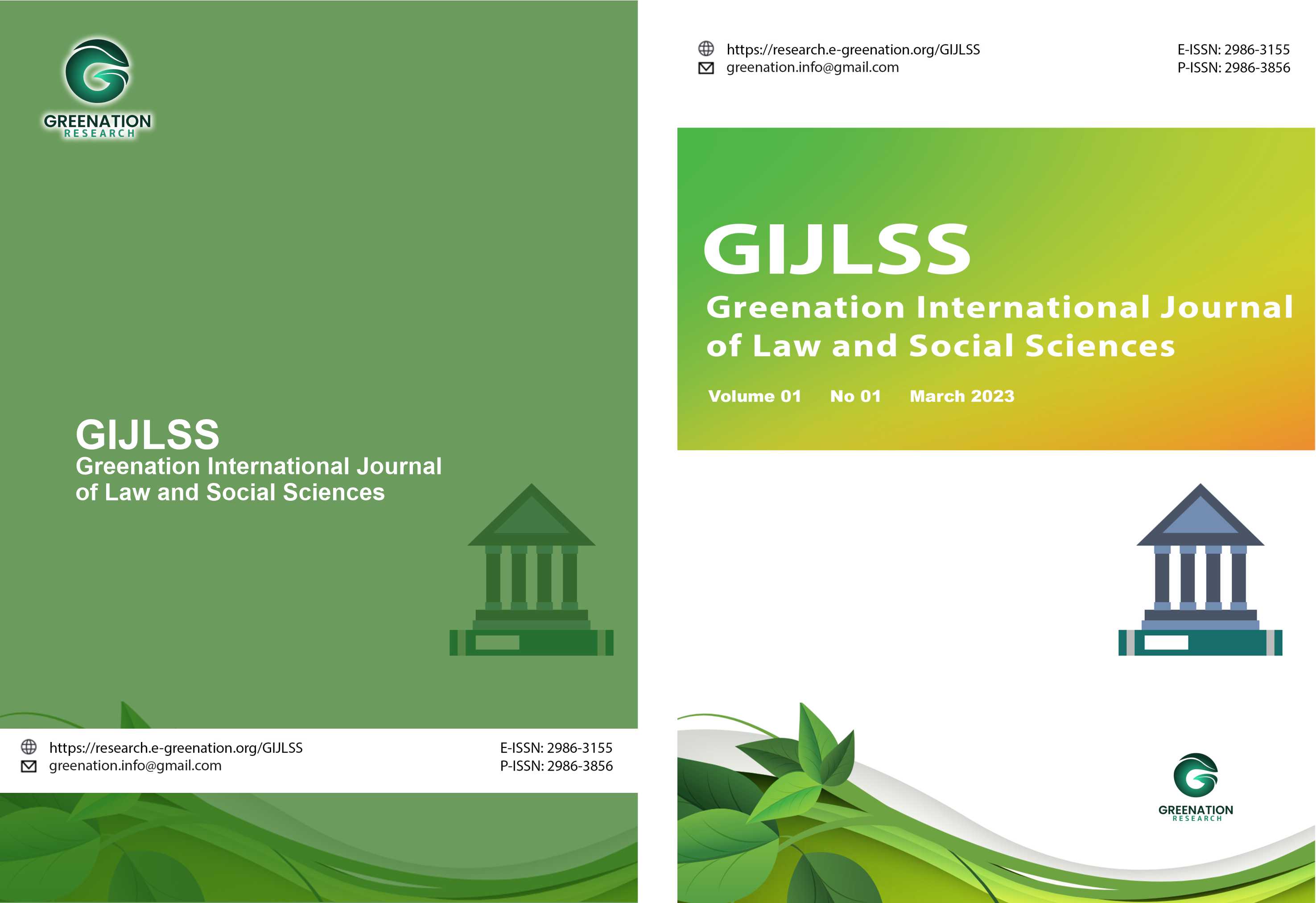Distortion of Gratuities In Acquittal (Vrijspraak) Verdict in Corruption Case Juridical Analysis of the Central Jakarta District Court Decision Number: 37/Pid.Sus-Tpk/2021/PN.Jkt.Pst
DOI:
https://doi.org/10.38035/gijlss.v2i4.325Keywords:
Corruption, Gratuities, Bribery, Legal Politics, Legal FindingsAbstract
This study aims to examine and analyze the acts of gratuities givers in the Central Jakarta District Court Decision Number: 37/Pid.Sus-Tpk/2021/PN.Jkt.Pst related to the application of article 5 paragraph (1) letter a and article 13 of law number 31 of 1999 as amended by law number 20 of 2001 concerning the eradication of corruption. This descriptive research uses a normative legal research method through Study Literature legal research using two approaches, namely the statute approach and the case approach. The types of data used are primary data and secondary data. The technique used in the collection of primary legal materials in this study is through literature search by analyzing court decisions, while in secondary legal materials through literature studies and document studies. This study uses a descriptive method analysis technique, namely providing an overview or explanation of the subject, object, and research results, however, the results of this research are not justified by the researcher. The results of this study show that the panel of judges acquitted the defendant, the judge's decision in this case stated that one of the considerations is regarding the absence of a criminal article that regulates the existing act of giving gratuities is the action of the recipient of gratuities, the results of this research are intended to contribute to the literature on gratuities for law enforcement and the eradication of corruption, Unlike the previous research which focused on the application of the article of indictment, this study focuses on the consideration of the Council of Judges about the elements of giving or promising something to a civil servant or state administrator. Using legal political theory and legal findings, this study assesses the legislative policy related to gratuities and the legal interpretation of judges in the condition of legal vacuum. Through a normative and empirical juridical approach, this research produces an in-depth analysis as an academic and practical contribution to the eradication of corruption, especially related to gratuities. The targeted outputs in the form of policy recommendations for regulatory improvement and legal practice guidelines are presented in the form of international journals. The level of research readiness is on an exploratory scale, with the potential for policy implementation.
References
Arief, Barda Nawawi, the effectiveness of legal tools to overcome corruption crimes. Paper at the seminar "Countering Corruption in the Era of Increasing the Rule of Law", Yayasan Setia Karya, Gracia Hotel Semarang, November 11, 2001
Central Jakarta District Court Decision Number: 37/Pid.Sus-Tpk/2021/PN.Jkt.Pst
Harahap, Yahya, Civil Procedure Law on Lawsuits, Trials, Confiscation, Proof and Court Decisions, Jakarta: Sinar Grafika, 2005
Hatta, H. Moh, Criminal Political Policy (Law Enforcement in the Context of Crime Control), Pustaka Siswa, Yogyakarta, 2010
Hidayat, Wahyu, Ahmad University, Dahlan Yogyakarta, Judicial Institutions, and Public Civilization. “Social Engineering of Judicial Institutions to Realize Public Civilization,” 2019, 309–40.
https://www.pta-banten.go.id/artikel-pengadilan/842-side-philosophy-in-ruling-hakim-ridho-afrianedi-s-h-i-lc-m-h, accessed on October 10, 2023
Kahar, Muhammad Paeway Ebiem, Khoirul Lukman Rahmatullah, Faza Yuris, Ainul Azizah, and Sapti Prihatmini. "Bribery and Gratuity in Corruption: A Case Study of Judges' Decisions in Law Enforcement Practice." Journal of Anti-Corruption 13, no. 1 (2023): 46–58. https://doi.org/10.19184/jak.
Law Number 20 of 2001 concerning Amendments to Law Number 31 of 1999 concerning the Eradication of Corruption
Law Number 31 of 1999 concerning the Eradication of Corruption
Manan, Bagir, A Review of Indonesia's Judicial Power in Law No.4 of 2004, Jakarta, Supreme Court of the Republic of Indonesia, 2005
Mappiasse, Syarif, Legal Logic of Judges' Decision Considerations, Prenada Media Group, Jakarta, 2015
Marzuki, Peter Mahmud. Legal Research. Jakarta: Kencana Prenada Group, 2005
Mertokusumo, Sudikno, Knowing the Law, Yogyakarta, Liberty, 1999
Muharatulloh, Edshafa. "The imposition of maximum criminal penalties for corruption crimes committed during the pandemic." Multidisciplinary Scientific Journal 2, no. 3 (2023): 2023.
Muladi, Barda Nawawi Arief, Criminal Theories and Policies, PT. Alumni, Bandung, 2010
Muladi, Diah Sulistyani, The Complexity of the Development of Criminal Acts and Criminal Policies, PT. Alumni, Bandung, 2016
Mulyadi, Lilik Corruption Crimes in Indonesia, Normative, Theoretical, Practice and Problems, PT. Alumni, Bandung, 2007
Nadya, Syafira. "Juridical Review of Criminal Acts of Receiving Gratuities Based on Law Number 31 of 1999 Jo Law Number 20 of 2001 concerning the Eradication of Corruption Crimes," JOM Faculty of Law Volume II, number 2, March 2015
Nugroho, Hibnu, Integralization of Corruption Investigation in Indonesia, Media Prima Aksara, Jakarta, 2012
Nurliza, Vira. A Sign Of Thank You That Could Lead To A Criminal Act Of Corruption Type Of Gratification,”jurnal hukum Derechtsstaat Volume 9 No 2 sept 2023.
Zaidan, M Ali Criminal Policy, Sinar Grafika, Jakarta, 2016
Downloads
Published
How to Cite
Issue
Section
License
Copyright (c) 2025 Ai Permatasari, Sirrinawati Sirrinawati, Suarman Gulo, Aep Sulaeman, Imas Rosidawati Wiradirja

This work is licensed under a Creative Commons Attribution 4.0 International License.
Copyright :
Authors who publish their manuscripts in this journal agree to the following conditions:
- Copyright in each article belongs to the author.
- The author acknowledges that the Greenation International Journal of Law and Social Sciences (GIJLSS) has the right to be the first to publish under a Creative Commons Attribution 4.0 International license (Attribution 4.0 International CC BY 4.0).
- Authors can submit articles separately, arrange the non-exclusive distribution of manuscripts that have been published in this journal to other versions (for example, sent to the author's institutional repository, publication in a book, etc.), by acknowledging that the manuscript has been published for the first time at GIJLSS.























